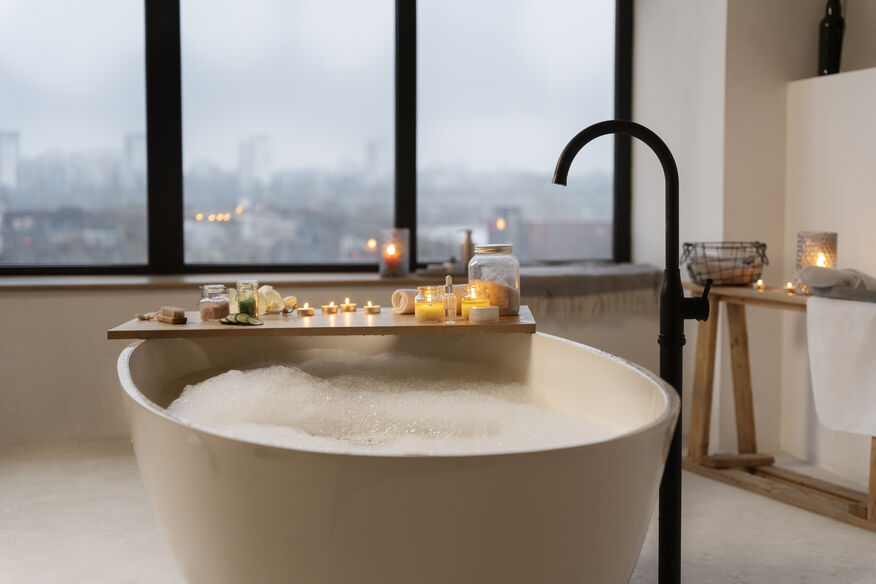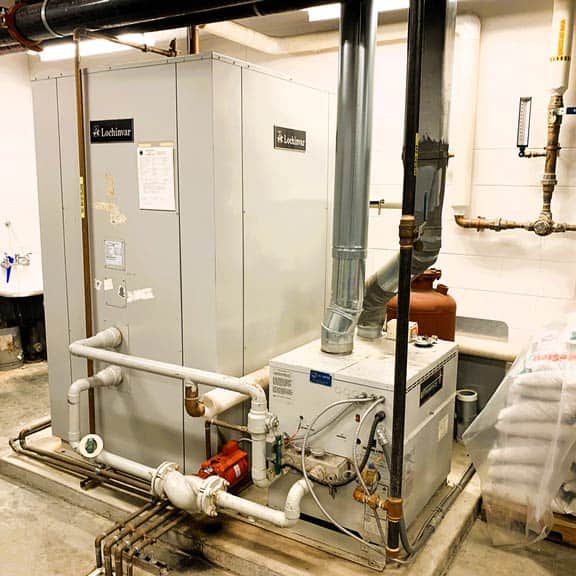In the world of hospitality, hot water isn’t an optional luxury; it’s a necessity. For hotels, resorts, and spas, hot water is critical for maintaining smooth operations, enhancing customer satisfaction, and upholding overall service standards. Guests expect clean rooms and linens, as well as the much-needed hot shower after a long day.
To ensure your establishment maintains a steady supply of hot water for guests, you may be wondering whether to opt for a boiler system or a traditional water heater. Both options have merits, and today we’ll break down the decision points to guarantee you have hot water capable of servicing the entire building.

How Much Water Do Hotels Use?
The hospitality industry spans the entire world, and globally, hotels use a significant amount of water – from hot water applications such as laundry, dishes, and guest showers to pools, toilets, and lawn irrigation. According to the EPA, hotels and lodging facilities account for about 15% of all water use in commercial buildings throughout the United States.
Of course, several factors influence demand. You’ll use less water during off-peak seasons and when occupancy rates are lower than normal. You’ll use more water if your hotel offers amenities such as a pool, spa, restaurant, or laundry service. You’ll use even more if these amenities are open to the public and are not exclusive to hotel guests. Since water usage affects profits, it’s a smart business move for hotel owners to take steps to reduce water usage and costs.
Without hot water, your guests won’t be truly comfortable. Whether guests stay for one day, a week, or a month, they’ll need to shower or bathe. Though you may hear about the benefits of a cold shower, most people don’t want to try cryotherapy in their hotel rooms. Extended-stay hotels with kitchenettes will require additional hot water, allowing guests to wash dishes and prepare food.
Your staff needs hot water, too. Can you imagine how you’d keep your bedding and towels clean and bright white without it? Washing machines can only do so much with cold water.
How would your kitchen staff prepare meals, keep rooms clean, and maintain sanitary dinnerware without it? They wouldn’t.
Reliable Hot Water: Meeting Guest Expectations While Avoiding Operational Disruptions
Compared to residential properties, hotels need a more complex system to maintain a continuous hot water supply. In a home, it’s as simple as installing an appropriately sized water heater and choosing between a standard tank model or a tankless water heater system to provide hot water on demand. You can heat enough water for your entire home with the right-sized system.
In a hotel, you not only need a system capable of heating water, but you must be able to deliver it anywhere in the building at any time. You also need enough hot water to handle washing all the linens while ensuring guests have enough for their needs as well.
To meet peak demand, hotels typically opt for multiple commercial water heaters in different areas of the hotel, or a combination of hot water boilers, storage tanks, and recirculating lines to provide instantaneous hot water to all guests and staff throughout the building. By installing boilers, hotels have a centralized water heating system that feeds the hot water into storage tanks, so it can be used throughout the facility when needed.
Depending on the size of your hotel and its amenities, you may be able to install a single large boiler, accompanied by only a few additional storage tanks to retain and deliver hot water throughout the building. However, you may be better off installing multiple large water heaters around the property to service each area independently. It all depends on size and needs, which is why it’s crucial to have a professional assess your situation to make sure it’s done correctly.
Whether your hotel uses multiple water heaters or a boiler system, a recirculating water line is a must. In a recirculating system, a pump continuously circulates hot water through the pipes throughout the building. This system maintains a constant water temperature and keeps it readily available for immediate use by anyone in the building who needs it.

Boilers vs. Water Heaters: What’s the Difference?
Although you may hear the terms ‘boiler’ and ‘water heater’ used interchangeably, they are NOT the same. Water heaters generate and store hot water, whereas boilers can be utilized in various ways, including but not limited to water heating, pool heating, and space heating.
While boilers can be used for various purposes, including radiant heat, today we’re specifically discussing the use of boilers for domestic hot water (water used for drinking, bathing, laundry, and food preparation) rather than space heating.
It’s also important to understand that one of the main differences between boilers and water heaters is that boilers heat; they do not store. A boiler typically resembles a large box with water connections, ventilation openings, and an internal heat exchanger – usually an arrangement of tubes in which water is heated. Often fueled by natural gas, the hot gases from the furnace pass through long steel or copper tubes, transferring heat to the water surrounding them. Once the boiler has done its job of heating the water, the water moves through the pipes and/or into storage tanks.
Boilers are particularly well-suited for high-demand applications. There are numerous types of heat exchangers with varying efficiencies, and larger boilers often feature multiple heat exchangers, providing increased heating power, as well as redundancy in case one fails. Copper heat exchangers are more expensive than steel, but are considered highly efficient due to copper’s ability to retain heat, providing better heat transfer than steel. Copper is also naturally corrosion-resistant.
If you’re selecting a boiler for your hotel, there are many options to choose from. Fortunately, professionals at Reliable Water Services can help guide you in finding the best solution to the boiler vs. water heater question. It’s all about measuring your use.
When comparing options, it’s a necessity to address the similarities between water heaters and boilers, regardless of which one you choose. Both options are available in standard and high-efficiency models, and both types can be paired with a circulating pump to maintain water flow.
Beyond the similarities, it’s easy to see why people might confuse the different types of water heating options. A boiler heats water and distributes it throughout the building to provide domestic hot water or radiant/environmental heat. (A combi unit does both—providing water and heat.)
A tank-type water heater is similar to the water heater system you likely have in your home. It features a heating element and a tank to store water until it is needed. These are often referred to as standard water heaters.
Tankless heaters, on the other hand, don’t store hot water; instead, they heat ground water by passing it through heated coils. While this may sound like a great solution for endless hot water, tankless heaters can only process a certain number of gallons per minute (GPM). The colder the groundwater, the lower the GPM will be. For high GPM applications, such as hotels with fixtures in every room, tankless water heaters aren’t a practical solution (unless you want to install one in each room of your hotel).
Boilers and water heaters can both be used for domestic hot water. Water is heated in sealed tanks and delivered through the building, and both tanks are pressurized. So, which one is right for you?
What it often boils down to is the size and layout of your hotel, along with the amenities your facility offers. Smaller motels that do not provide on-site laundry or a kitchen will have very different hot water needs than a larger hotel with a restaurant and spa. While a boiler system connected to multiple storage tanks throughout the hotel may be perfect for larger hotels, that same setup could be considered overkill for a smaller motel.
If it’s hard to understand the different options, don’t worry. A water heater specialist can help you find the ideal solution for your particular situation. For some, a boiler will be the perfect selection, and for others, a standard water heater might be the best option.
Any water heating system requires regular maintenance. Improper settings and temperature controls can lead to hazards such as scalding. They can also promote bacterial growth, such as Legionella. Therefore, it’s also crucial to have a professional maintenance plan for any water heating solution; however, boilers tend to require more preventive maintenance measures than water heaters.

Benefits and Drawbacks of Different Commercial Water Heating Systems
If you want to compare your boiler and water heater options side by side, we can break it down into a simple pros and cons list. Remember, though, that a commercial water heating system is a significant investment, so it’s essential to ensure the options meet your unique location, capacity, future goals, and other relevant factors.
Pros of Boilers
- Simplified Venting: Boilers can be installed in a single, central location within a large building and vented from there while still feeding into hot water storage tanks located elsewhere throughout the facility. The storage tanks don’t require any venting, providing more versatile installation options.
- More power options: Gas boilers are available in a range of sizes and power inputs, but their sizes typically max out at much higher BTU inputs than tank-type water heaters do. As a result, a single boiler can easily produce more hot water per hour than a standard water heater.
- Multiple Heat Exchangers: Many larger boiler models feature multiple heat exchangers, providing built-in redundancy; if one fails, the boiler can still operate, albeit at a slightly reduced output.
- Flexible Capacities: Boilers are well-suited for high-demand situations, as they can supply hot water to storage tanks that can store plenty of heated water for distribution throughout the building as needed. These storage tanks come in a wide range of sizes, ensuring a steady supply of hot water. A boiler itself has no storage; it is connected to a storage vessel of some sort, which can range from 80 to 4,000 gallons.
- Energy Efficiency: Most modern hot water boiler systems are available in energy-efficient models, with modulating burners and highly efficient condensing technology.
Cons of Boilers
- Higher Initial Costs: Installation and setup can be more expensive than purchasing a water heater. (It’s important to note that the wrong setup of a boiler or standard water heater can end up being costly in the long term, so be sure to get it right!)
- Complex Maintenance: Boilers require specialized servicing and regular inspections to maintain safety and efficiency.
- Pressure Risks: Without proper maintenance, there’s a risk of explosion due to the high pressure.
Pros of Water Heaters
- Energy Efficiency: Modern water heaters, particularly condensing models, are remarkably energy-efficient. Reducing energy consumption saves money and contributes to environmental sustainability.
- Lower Upfront Costs: The initial investment is more affordable than boiler installation.
Cons of Water Heaters
- Limited Capacity: Hotels may struggle to meet the high demands without installing multiple units or supplementary/redundant systems.
- Potential Downtime: If the water heater fails, the lack of hot water storage may lead to service interruptions.
- Scaling and Sediment Buildup: Over time, minerals accumulate on the anode rod and inside the tank, reducing efficiency and potentially leading to overheating or failure.
Boiler vs. Water Heater: Comparing Performance, Efficiency, and Costs for Hospitality Needs
When it comes to boilers vs. water heaters in hotels specifically, you’ll need to determine what makes the most sense for your hotel’s amenities and footprint.
Scalability and Space
Standard tank-type water heater models require floor space and proper venting. Boilers can often be wall-mounted to save space, but larger buildings, such as hotels, require sufficient storage to meet demand.
One of the major benefits of using a boiler with storage tanks for your hotel’s hot water is the flexibility it offers in terms of storage capacity. Tank-type water heaters typically have a capacity of 100 gallons each, so it’s common to need to install multiple heaters in tandem. Often, sets of two to three heaters are installed in various areas of the building to ensure sufficient hot water for all areas. These will occupy a significant amount of floor space and require separate venting where the heaters are installed, which limits the viable options for their placement.
Boilers can offer increased flexibility. They will also often be tied to multiple storage tanks throughout a facility. Storage tanks are available in a significantly wider range of sizes, in both vertical and horizontal models, starting at 80-gallon tanks and ranging up to 4,000 gallons. A single boiler, centrally located in a building, can still supply multiple storage tanks with hot water for different parts of the facility, or a single large storage tank that serves the entire facility. Additionally, storage tanks don’t require any venting or gas connections, providing more flexibility for their installation location.

Cost and Lifespan
In a simple cost comparison, water heaters are generally cheaper to purchase and install than boilers. But, you need to realize that this comparison is actually apples to oranges. Costs come down to the hot water needs of your business, the type and size of the boiler, and how many storage tanks are needed (and their location).
A single, high BTU boiler tied to multiple storage tanks could ultimately be cheaper overall compared to installing 5-8 giant commercial water heaters throughout your building, while still achieving the same amount of hot water.
Both require regular inspection and maintenance to maximize their performance. With proper upkeep, however, you can expect a standard water heater to last 8 to 12 years. Gas-fired boilers typically last an average of 10 to 15 years, and proper care can extend their lifespan too.
Energy Efficiency
Boilers are measured by annual fuel utilization efficiency (AFUE). They can be highly efficient, with some models on the market today achieving an efficiency of 95% or higher. These are generally sealed combustion condensing units.
Water heaters are measured by their energy factor (EF), which indicates the amount of hot water they produce per unit of fuel used. Boilers are generally considered more energy efficient than standard water heaters because they waste less energy. Of course, efficiency also depends on use and fuel source.
As you can see, the breakdown between boilers vs. water heaters will vary for each hotel. Regardless, one thing is sure—heated water is essential for hotel operations. To be successful, you need a system that can meet the demands of your guests now and well into the future.
It’s incredibly worthwhile to get it right from the start. Investing in the wrong system will increase the likelihood of service disruptions, which can make or break your hotel’s reputation (and ultimate success).
Contact the team at Reliable Water Services to equip your hotel or resort with an optimal system tailored to your specific needs. We’ll help you compare and contrast your options to ensure you get the right boiler and storage tanks or the correct commercial water heater. What’s more, we’ll help you keep it in tip-top shape with maintenance plans and 24/7 emergency repairs. When you need hot water, we’re there to make sure your guests get exactly what they expect.